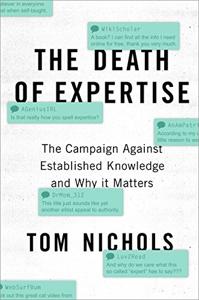
Want to learn the ideas in The Death Of Expertise better than ever? Read the world’s #1 book summary of The Death Of Expertise by Thomas M. Nichols here.
Read a brief 1-Page Summary or watch video summaries curated by our expert team. Note: this book guide is not affiliated with or endorsed by the publisher or author, and we always encourage you to purchase and read the full book.
Video Summaries of The Death Of Expertise
We’ve scoured the Internet for the very best videos on The Death Of Expertise, from high-quality videos summaries to interviews or commentary by Thomas M. Nichols.
1-Page Summary of The Death Of Expertise
Introduction
People are becoming less knowledgeable and more disrespectful of experts. This is because the internet gives them access to tons of facts, but not expertise. They also don’t have a good grasp on journalism and education. As a result, people believe they can be an expert in anything if they know enough about it. But that’s not true; there’s no substitute for experience when it comes to knowledge or expertise. And with the death of expertise will come centuries—maybe even millennia—of lost knowledge.
There are five arenas where expertise is degrading: Public debate, higher education, the internet, journalism and expert mistakes. The assumption that everyone knows everything in public debates has made conversation exhausting. The commodification of college has resulted in graduates believing they’re experts even though they lack credentials or true expertise. Having too much information at our fingertips on the internet has made laypeople think they know more than professionals when it comes to a variety of topics. Journalism’s degradation has led to an ill-informed yet overconfident public who thinks they have all the answers but really don’t know what’s going on in their own lives let alone the world around them. And while experts can make mistakes like anyone else, it’s less likely for them to do so because of their background knowledge and experience with certain issues or problems.
Experts and Citizens
Experts and citizens have always had conflicts, but they’re more extreme now than before. Citizens believe that they can be experts in anything despite their obvious limitations on knowledge. But society as it is today couldn’t exist without the division of labor and reliance on genuine expertise because specialization has driven human innovation for the last century or so. The reason people want to know everything is that it makes them feel autonomous, powerful, and independent. These are virtues, but we shouldn’t disrespect specialized expertise that can literally save lives because of these reasons.
People are often reluctant to accept criticism because they think the critic is saying that they’re stupid. People also assume that if someone has expertise in a subject, then he or she will be arrogant and condescending. However, it’s important to remember that experts aren’t always right; however, they tend to make fewer mistakes than laypeople do within their field of expertise.
Moreover, the death of expertise is not just a complaint on behalf of experts; it could also undo years of progress that citizens benefit from. For example, Scott Pruitt and Andrew Wheeler are climate change deniers who have undone years of conservation work at the Environmental Protection Agency.
How Conversation Became Exhausting
Public debate has become exhausting and combative. People are unwilling to admit when they’re wrong, as evidenced by a Twitter exchange in which a student asked for help learning about the chemical properties of sarin gas. When an expert offered to help her and pointed out that sarin isn’t a gas, she responded with expletives, admonishing him for correcting her.
There are several reasons why people don’t admit they’re wrong. First, it’s because of the fear of being seen as incompetent and not taken seriously. Secondly, some people just aren’t smart or educated enough to understand what they’re saying in the first place. The rate of change is too fast for most schools to keep up with, so a lot of students learn at their own pace anyway.
Another thing is the Dunning-Kruger effect, which essentially means that if you’re not knowledgeable about a subject, you won’t realize it. This is because unintelligent people lack metacognition: they can’t know what they don’t know.






